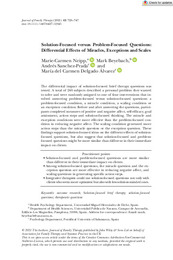Please use this identifier to cite or link to this item:
https://hdl.handle.net/11000/35779Full metadata record
| DC Field | Value | Language |
|---|---|---|
| dc.contributor.author | Neipp, Marie-Carmen | - |
| dc.contributor.author | Beyebach, Mark | - |
| dc.contributor.author | Sánchez-Prada, Andrés | - |
| dc.contributor.author | Delgado Álvarez, María del Carmen | - |
| dc.contributor.other | Departamentos de la UMH::Psicología de la Salud | es_ES |
| dc.date.accessioned | 2025-03-04T11:16:17Z | - |
| dc.date.available | 2025-03-04T11:16:17Z | - |
| dc.date.created | 2021-05-31 | - |
| dc.identifier.citation | Journal of Family Therapy (2021) 43: 728–747 | es_ES |
| dc.identifier.issn | 1467-6427 | - |
| dc.identifier.issn | 0163-4445 | - |
| dc.identifier.uri | https://hdl.handle.net/11000/35779 | - |
| dc.description.abstract | The differential impact of solution-focused brief therapy questions was tested. A total of 246 subjects described a personal problem they wanted to solve and were randomly assigned to one of four interventions that involved answering problem-focused versus solution-focused questions: a problem-focused condition, a miracle condition, a scaling condition or an exception condition. Before and after answering the questions, participants completed measures of positive and negative affect, self-efficacy, goal attainment, action steps and solution-focused thinking. The miracle and exception conditions were more effective than the problem-focused condition in reducing negative affect. The scaling condition generated more action steps than the miracle question or the exception question. These findings support solution-focused ideas on the different effects of solution-focused questions, but also suggest that solution-focused and problem-focused questions might be more similar than different in their immediate impact on clients. | es_ES |
| dc.format | application/pdf | es_ES |
| dc.format.extent | 20 | es_ES |
| dc.language.iso | eng | es_ES |
| dc.publisher | Wiley | es_ES |
| dc.rights | info:eu-repo/semantics/openAccess | es_ES |
| dc.rights | Attribution-NonCommercial-NoDerivatives 4.0 Internacional | * |
| dc.rights.uri | http://creativecommons.org/licenses/by-nc-nd/4.0/ | * |
| dc.subject | outcome research | es_ES |
| dc.subject | Solution-focused brief therapy | es_ES |
| dc.subject | solution-focused questions | es_ES |
| dc.subject | therapeutic questions | es_ES |
| dc.subject.other | CDU::1 - Filosofía y psicología::159.9 - Psicología | es_ES |
| dc.title | Solution-Focused versus Problem-Focused Questions: Differential Effects of Miracles, Exceptions and Scales | es_ES |
| dc.type | info:eu-repo/semantics/article | es_ES |
| dc.relation.publisherversion | https://doi.org/10.1111/1467-6427.12345 | es_ES |

View/Open:
Journal of Family Therapy - 2021 - Neipp - Solution‐Focused versus Problem‐Focused Questions Differential Effects of.pdf
210,32 kB
Adobe PDF
Share:
.png)
